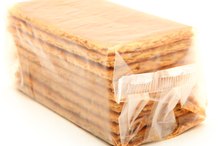What does fact checked mean?
At Healthfully, we strive to deliver objective content that is accurate and up-to-date. Our team periodically reviews articles in order to ensure content quality. The sources cited below consist of evidence from peer-reviewed journals, prominent medical organizations, academic associations, and government data.
- Eat Right: Nutrition for Growing Bodies
- National Diabetes Education Program: Tips for Kids with Type 2 Diabetes
The information contained on this site is for informational purposes only, and should not be used as a substitute for the advice of a professional health care provider. Please check with the appropriate physician regarding health questions and concerns. Although we strive to deliver accurate and up-to-date information, no guarantee to that effect is made.
List of Carbohydrate Foods for Kids
Carbohydrates are used by the body for energy. Complex carbohydrates are broken down slowly and provide long-term energy. Simple carbohydrates are used quickly and provide short bursts of energy. Children over the age of 2 should consume 50 to 60 percent of their daily calories from carbohydrates, according to Kids Health.org 1. Offering healthy carbohydrates over those with less nutrition is important for your child’s overall health 1.
Whole Grains
Whole grains are a nutrition-packed carbohydrate choice for children. They grains have been minimally processed to retain B vitamins, fiber and carbohydrates. Whole grains include brown or wild rice, whole wheat, millet, quinoa and barley. These grains may be found in a variety of kid-friendly foods like whole grain wheat breads and bread products, cereals and whole grain pasta. It is best to choose products that list whole grain as the first or second ingredient on their labels. Enriched grains, like white rice, also contain carbohydrates, but lose nutritional value during processing. Vitamins and nutrients are added back to enriched grain products, but they still do not offer the same nutrition and fiber benefit as whole grains. KidsHealth.org suggests choosing whole grain products over enriched grain products as much as possible for better nutrition.
- Whole grains are a nutrition-packed carbohydrate choice for children.
- KidsHealth.org suggests choosing whole grain products over enriched grain products as much as possible for better nutrition.
Fruits and Vegetables
Foods Containing Glucose or Fructose
Learn More
Fruits and vegetables contain carbohydrates, vitamins and minerals that provide growing children with nutrition and energy. Choose fruits that your child enjoys and incorporate them into meals and snacks. Vegetables may be enjoyed raw or cooked. The National Diabetes Education Program recommends children consume 2 to 2 1/2 cups of raw or cooked vegetables per day. Good vegetable carbohydrate choices include:
- carrots
- broccoli
- salad greens
- corn
- peas
- peppers
- Fruits and vegetables contain carbohydrates, vitamins and minerals that provide growing children with nutrition and energy.
Dairy Product
Milk and milk products are good carbohydrate choices for kids 1. Dairy products offer calcium for growing bones and teeth as well as carbohydrates for energy. Choose low-fat dairy products to avoid unnecessary fat and calories. Low-fat milk, yogurt, ice cream, cheese and cream cheese are good dairy choices.
- Milk and milk products are good carbohydrate choices for kids 1.
- Dairy products offer calcium for growing bones and teeth as well as carbohydrates for energy.
Snacks
Diet for Children With Pneumonia
Learn More
Snack foods may offer carbohydrates, but not necessarily the good kind. Some simple carbohydrates, like refined white sugar, do not offer nutritional value and do not provide the body with long-term energy 1. Kids should consume snacks and other foods with high sugar content in moderation. It is best to limit their consumption of candy, cakes, cookies and sodas.
- Snack foods may offer carbohydrates, but not necessarily the good kind.
- Kids should consume snacks and other foods with high sugar content in moderation.
Related Articles
References
- Kids Health.org: Carbohydrates, Sugar and your Child
- Help Guide.org: Healthy Eating : Easy Tips for Planning a Healthy Diet and Sticking to It
- Cleveland Clinic. Glycogen storage disease (GSD). Updated August 2, 2019.
- Poti JM, Braga B, Qin B. Ultra-processed food intake and obesity: What really matters for health-processing or nutrient content?. Curr Obes Rep. 2017;6(4):420-431. doi:10.1007/s13679-017-0285-4
- Winwood-Smith HS, Franklin CE, White CR. Low-carbohydrate diet induces metabolic depression: A possible mechanism to conserve glycogen. Am J Physiol Regul Integr Comp Physiol. 2017;313(4):R347-R356. doi:10.1152/ajpregu.00067.2017
- Hervik AK, Svihus B. The role of fiber in energy balance. J Nutr Metab. 2019;2019:4983657. doi:10.1155/2019/4983657
- Kunzmann AT, Coleman HG, Huang WY, Kitahara CM, Cantwell MM, Berndt SI. Dietary fiber intake and risk of colorectal cancer and incident and recurrent adenoma in the prostate, lung, colorectal, and ovarian cancer screening trial. Am J Clin Nutr. 2015;102(4):881-90. doi:10.3945/ajcn.115.113282
- Slavin J, Carlson J. Carbohydrates. Adv Nutr. 2014;5(6):760-1. doi:10.3945/an.114.006163
- Reynolds A, Mann J, Cummings J, Winter N, Mete E, Te Morenga L. Carbohydrate quality and human health: A series of systematic reviews and meta-analyses. Lancet. 2019;393(10170):434-445. doi:10.1016/S0140-6736(18)31809-9
Writer Bio
Elizabeth Otto has been writing professionally since 2003. She is a licensed emergency medical technician-intermediate with over 10 years of experience in the field. She has worked as a clinical assistant in family health and emergency medicine since 1995. Otto is a freelance writer for various websites and holds an Associate of Science in medical assisting from Commonwealth College.









